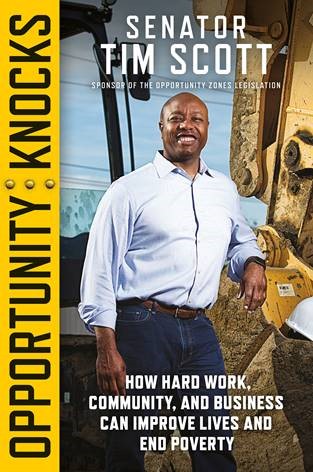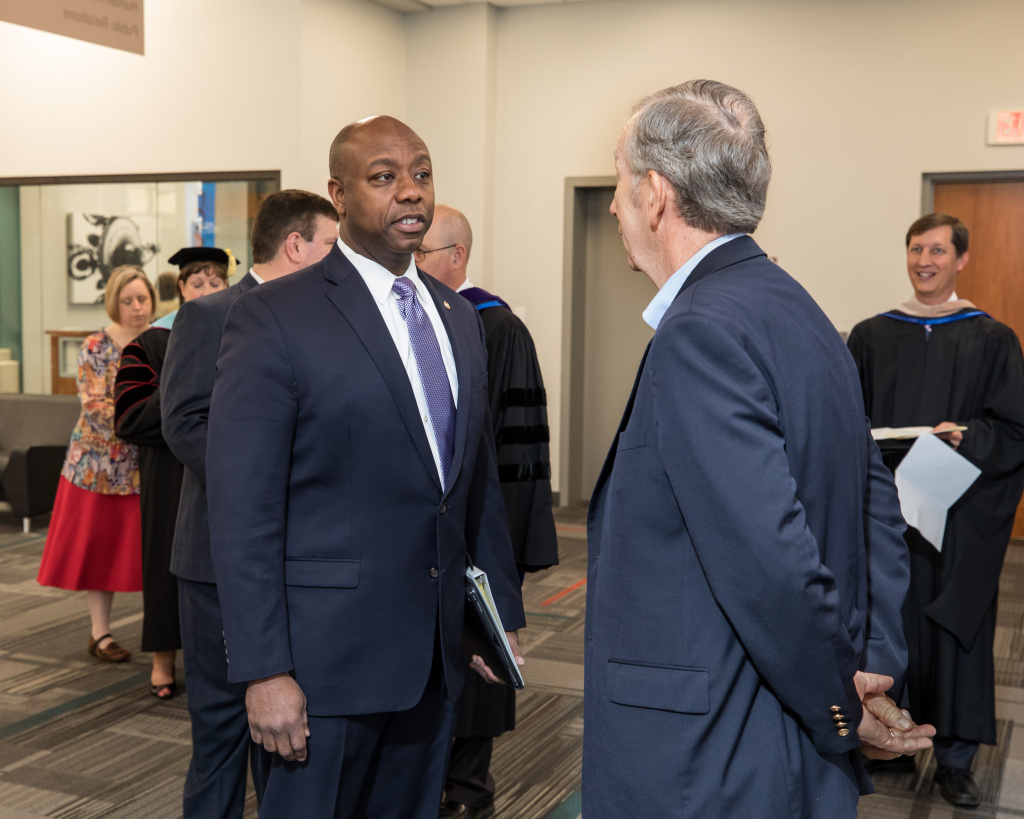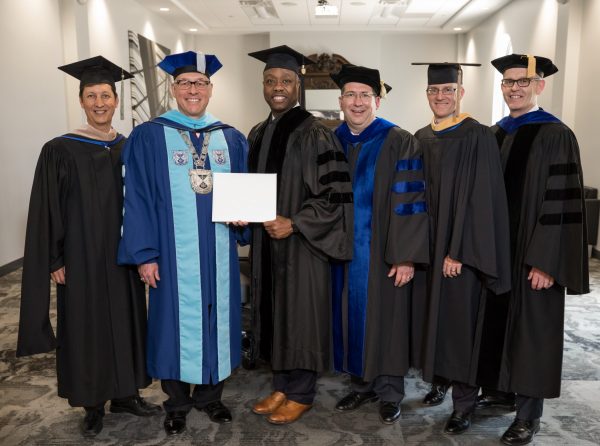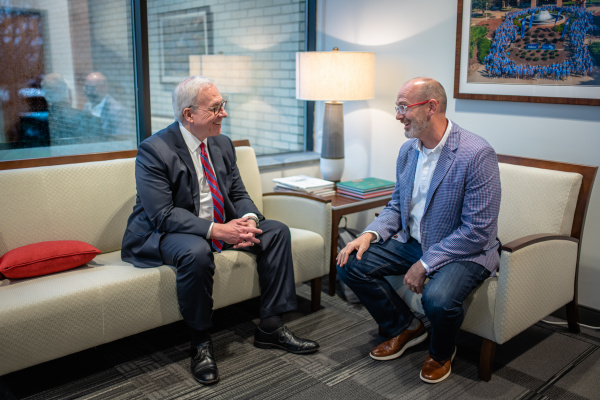We named this podcast Highest Potential because we wanted to share stories of how Bob Jones University helps students reach their highest potential for God’s glory.
In this episode, we’ll be talking with someone who has dedicated much of his life to helping his constituents reach their highest potential. Having served in the United States Senate since 2013, Senator Tim Scott has focused his energy on unleashing the positive impact that happens when hard work meets opportunity.
His positive influence and strong Christian testimony led BJU to award Senator Scott with an honorary Doctor of Laws degree in 2018.
Senator Scott recently released a book entitled, Opportunity Knocks: How Hard Work, Community, and Business Can Improve Lives and End Poverty. In my conversation with him today, we discuss his new book, his life story and his faith.
Don’t forget that you can listen to this episode and all future episodes on Apple Podcasts, Spotify or wherever you get your podcasts. If you enjoy this episode, I’d really appreciate if you left us a positive review — it will help others find our podcast.
Opportunity Knocks podcast transcript
(Music)
Pettit: Welcome to a special episode of Highest Potential. I’m Dr. Steve Pettit, president of Bob Jones University in Greenville, South Carolina. We named this podcast Highest Potential because we wanted to share stories of how BJU helps students reach their highest potential for God’s glory.
Well today, we’ll be talking with someone who has dedicated much of his life to helping his constituents reach their highest potential. Having served in the United States Senate since 2013, Senator Tim Scott has focused his energy on unleashing the positive impact that happens when hard work meets opportunity. His positive influence and strong Christian testimony led BJU to award Senator Scott with an honorary doctor of laws degree in 2018.
Senator Scott recently released a book entitled Opportunity Knocks: How Hard Work, Community and Business Can Improve Lives and End Poverty. In my conversation with him today, we’ll discuss his new book, his life story and his faith.
Hope you’ll enjoy it.
(Music)
Pettit: Well, Senator Scott, many of our listeners may have never met you, so if you don’t mind, tell us about your fascinating life journey from South Carolina to the United States Senate.
Scott: Well, thank you sir. Without question, I was blessed with a powerful praying single mom, not the single part but the praying part. Growing up in a single-parent household with a mom who believed that prayer is the foundation and that she wants us to model the behavior and her sons should follow, which included going to work every day, 16 hours a day, three days a week, and eight hours a day, two days a week. She set for us, set in motion this notion that there is dignity in all work. She was a nurse’s aide, so perhaps one of the lowest rungs on the economic ladder in a hospital, but she took great pride in all that she did, and we had a great example to follow. And as you might imagine, there are lots of kids, hopefully, that can relate to my story which is, even if you have a good model to follow, you might not follow it all the time. I unfortunately did not follow it. In high school, I was more concerned with being the class clown and making my friends laugh than I was with doing my homework. My freshman year, I didn’t do very well at all and ended up having to repeat my freshman year because I failed World Geography and Civics, and that does, however, reflect God’s sense of humor that a United States senator today started by failing Civics and the study of politics as a freshman in high school.
And ultimately, my path was a fit path introspective with a strong Christian believer, a guy named John Moniz who ran the local Chick-fil-A. His story and my story have been woven together for decades now because of his impact as my mentor, teaching me some very basic biblical principles about significance and then some professional principles relative to success. And I think the combination between the praying mother, the model of work combined with the father love, the Heavenly Father’s love that was shown through a good, strong mentor and Christian values, all coupled together or combined together to lead me into public service and then finally to the United States Senate.
Pettit: Well, what a wonderful story about your family and then somebody who steps in who speaks both truth and love to you at the same time, and that is tremendous.
Well, a few weeks ago, you released your new book entitled Opportunity Knocks, and while some books start out slowly, your first paragraph – man, I thought it was awesome. It just immediately captured my attention as you described your visit to the Oval Office to visit President Trump in the wake of your self-described negative critique about his comments, concerning race riots, the race riots in Charlottesville. So, tell us about that trip to the Oval Office and how you were able to use it to champion what is dear to your heart, and that is the opportunity zones.
Scott: Well, President Trump was so gracious to invite me to the Oval Office after my nationally publicized critique. I must concede that any time the president of the United States, the most powerful person in the most powerful position invites you to his home turf, you should be shaking in your boots, and I was definitely shaking in my bright colorful socks and shoes. But I got to the White House, entered into the Oval Office, and the President did what few would ever have expected, but it seems to be in character. He was very deferential, and I say that, and I say that in a way that I want everybody to hear, the President – if you’re not attacking him – is responsive, responds with grace, and he was incredibly grace-filled with his response to my critique because I think he saw authenticity in it and he asked a leading question at the end of our conversation. He said, “Please help me help those I may have offended. How can I do that?” And my answer was, “Opportunity Zones.” I didn’t walk in there thinking about Opportunity Zones, but my mentor in politics was a guy named Jack Kemp who was considered a bleeding-heart conservative and he championed “enterprise zones” and I basically took the concept of enterprise zones and inverted it and made it into Opportunity Zones with a private sector focus. The president championed it the very next day and because of the president’s leadership on Opportunity Zones, we were able to get it passed into law, signed by the president, and now more than 67 billion dollars are in opportunity funds to go help communities where the average unemployment rate is twice as high as ours was before the coronavirus. And frankly, the average poverty rate is over 31% and our nation’s is around 12.
Pettit: Well, that is really moving, you know, I was not as familiar with the opportunity zones and I’m sure that a lot of our folks may not be. Can you kinda describe it like what it would be like in the state of South Carolina?
Scott: Yes sir, that’s a great question, thank you. There are 135 Opportunity Zones. The governors of each state, our governor in South Carolina is able to designate 25% of their highest poverty, highly distressed communities to receive that designation. With it comes, for those investors who thought a government program was all private sector dollars, for those investors who are willing to invest in one of the zones, they get a deferral of their capital gains tax for either five years or seven years, depending on how long of an investment you make. If you keep your investment in the project for 10 years, whatever the new project is, you keep it there for 10 years, you eliminate all of the new capital gains in that new project, and you reduce your original capital gains tax by 15%. So not only do you get a referral, you get a reduction, and ultimately, on the new part of the capital gains that would be required, you actually get an elimination. So, it is very heavy on incentives, and that has made the program quite attractive to investors.
Pettit: And so, of course, the incentives are not just financial, but it’s using your money to make an impact on people’s lives for good.
Scott: Yes sir, the goal from my perspective having grown up in some of those neighborhoods, if you bring opportunity close enough to the people living in the neighborhoods, they will have a far better outcome. And one of the lessons of my mentor John was that you learn to be significant by following your faith, our faith in Jesus Christ, and you learn to be successful through basic business principles.
More important than being successful, however, is being significant, and I think you see that in Matthew 25 as it relates to subsections of people and subcategories of people who desperately need assistance. I mean you’re bringing help to those who are in desperate need, you find that the Lord’s promise is fulfilled as we become His hands and feet, and to me, the ability to be a part of that engagement, a part of that conduit, to see that happen is one of the greatest blessings of public service is being able to help people who are where I used to be. And thank you Father for that opportunity to serve other people.
Pettit: That is wonderful. And I know our people, as they listen to this, are inspired and I think people want to do something and I’m so thankful God put you in that position. Throughout your book you mention that your mission in life is to positively affect the lives of a billion people. Well, that’s “billion” with a B, not an M. So, what opportunities has the Lord given you as a U.S. senator to positively accomplish that in affecting people?
Scott: Well, thank you sir. Again, I will say that when I set that goal at 19 years old, to be honest with you, I had no clue what a billion looks like. What I did know was that, unfortunately, my mentor John passed away at 38 years old. I was 19, and his goal was to positively impact the lives of a million people. And I thought to myself that I should do something to honor him, and the next number after million was billion, and I set out to do something that was ridiculous for a poor kid living in poverty, but once again, God in His divine wisdom and with a touch of humor, He set me on a course and now, as a United States senator, I was able to be one of four senators charged with the task of recreating our tax code, and that led to reducing the tax burden for single mothers by 73%, for dual-parent households who are still earners by 63%. We were able to get Opportunity Zones passed and that is gonna to affect millions of people. The tax code affects every breathing, walking American, and literally, the Lord has provided a way for me to, according to Ephesians 3:20 and 21, do exceedingly abundantly above all that I could ask or imagine. I cannot have imagined a. setting such an unrealistic goal and b. seeing how the Lord doesn’t just take baby steps. Sometimes it’s just a leap in the right direction. But all praise goes to Him. I was literally blessed with being able to see something that someone else did, Jack Kemp, and put it into the middle of a crisis with President Trump, and then get my friends and colleagues in the Senate to vote for it, you can’t beat that, and get in there and now we’re reaping the benefits of it. So those are just two examples, the tax codes being one, the Opportunity Zones being another, and criminal justice reform, another issue that the president and I campaigned together, and then there’s some healthcare things that we’ve done that will be helpful as well.
Pettit: You know, Senator, thinking about some of the things that you’re saying, that you know, when you think of the providence of God in how God uses people, He uses what’s in a person’s bag, or their life, and so much of this has flowed out of your own experience. And out of your own experience you have a heart, you have a compassion, you have feelings, but those feeling are dedicated to the Lord in the usefulness of helping other people. And so, instead of looking back in your past with regret, you can look back in your past with gratitude.
Scott: Absolutely.
Pettit: I mean, this to me is what’s so exciting and should encourage all of us, that some of our most difficult times of life can actually can be used in some of the greatest things that God uses in our life. So, that really leads to one of the chapters in your book that is aptly named “The Darkest Hour” and it details the April 2015 murder of Walter Scott and then the June 2015 premeditated murders of the nine church members at Mother Emanuel AME Church. And of course, while the government sought to ignite a race war in the country, the families, which to me is always moving, the families of the victims and the people of South Carolina instead, they came together.
So, how do you believe South Carolina has changed over the years? How can Christians across the country work together to promote racial unity?
Scott: I think the only way that we achieve the goal of racial unity is through faith in Jesus Christ. I think the greatest unifying force on earth is our faith and I liken it to; I think it’s Galatians 3:29 where we’re all adopted into the same family. You can be adopted into the Lord’s family, and that makes us brothers and sisters in Christ. So, from my perspective, in the aftermath of the Mother Emanuel Church shooting, what we saw was a. Matthew 5:44, praying for those that persecute you, loving your enemies, praying for those that persecute you. We saw that come in skin and bones with nine family members all saying to the killer, “We forgive you.” And that alone, the purest of light, agape love, flowing through nine grieving family members, set a fire, a whole new fire throughout our state, and we were changed in the blinking of an eye. And in Charleston we had 20,000, 15,000 people of all races come together on the Ravenel Bridge, holding hands in a state of unity, that was sparked by Christians who responded to a massacre and an atrocity by saying, “Yes, we believe in Matthew 5:44.” What a blessing to see that happen in the aftermath, and what we can do as Christians to promote racial unity is to remember that each of us, we are the family, we are the Body of Christ, and whether you’re the eye or the heart or just the little toe, you’re part of the same family and we were to treat each other as if we were brothers and sisters in the same family, we would do so much damage to the enemy’s camp, we would bring so much unity to this nation that the world would stop and say, “What in the world just happened in the United States of America?” I frankly think we’re on that path. I am thankful that the Church continues to rise in the midst of crisis. Even this coronavirus is proving to be, once again in the place where the Church is standing strong and our numbers are being counted. Our walls are down because our churches are closed, and on Easter Sunday we had empty churches, but the tomb was empty too, and that was a day of celebration. I’m pretty excited to see what is happening in the church right now. I think that lends itself to racial reconciliation, because what we’re starting to do is seeing ourselves in the eyes of Christ and through the eyes of Christ.
Pettit: That is powerful, and thank you, Senator, for that. It’s moving, and it is – I remember the event so well and can hardly talk about it without being moved by it. And of course, God breaks the hearts, that’s, you know, that’s what love is – love is broken hearts. And so, thank you so much for that.
As, you know, as you close your book, you demonstrate really a lot of optimism that you have for the United States in your presentation of an America 2030 proposal. And one of the key policies that you discuss is the need for education reform in school choice, and as a South Carolina state representative, you were a leader for school choice, and your passion for school choice hasn’t diminished as you’ve served in the House and the Senate. So, why do you believe that school choice is a key?
Scott: Well sir, I will say this, that I believe that without question, your zip code should not determine the quality of your education. I think that the quality of your education alone in many ways, save your faith in the Lord, determines your outcome in this nation. You look at the two major pillars of what separates the haves versus the have-nots, and it’s education and family formation. Two-parent households, you can avoid poverty no matter what color you are, no matter where you’re from, I think they say like 90% of the time, if you have two breadwinners in the same house. That said, I can’t do anything about family formation. I can do something about education, and so fighting for and on behalf of students who are stuck in the wrong zip code, should not mean that they are stuck for the rest of their lives. I have seen educational opportunity through school choice lead to the most successful opportunities known to man outside of our faith. That said, the final point I would say is simply this: if you want the freedom to worship and to practice the things that you believe and you want to do that at school, there is no better place to do that than in a private Christian school. Environment lays the foundation, rock solid, so as to serve you for the rest of your life. The ability to live out Proverbs 22:6 requires the ability to articulate and to speak it loud and clear about what you believe, and that child may depart for a little bit, but it’s coming straight back to the foundation. That foundation should be laid throughout this nation, and to do so, it probably requires private school choice.
Pettit: Well, thank you, Senator. That, of course, is where we are here at Bob Jones University. And yet, you know, our graduates go out and they go all over. We have graduates who are leaders in the public school system shining their light and then private schools. And I really appreciate your desire to see that happen.
Well, we could go on and on, and just so thankful that you were even willing to give us the time to talk about your book. And as we close, I’d like you, if you don’t mind, to read a selection from your book, because I believe this section really speaks to your optimism for who and what America is.
Scott: Well, thank you sir.
“Opportunities are the answer to success. We live in a country built on the foundation that all men are created equal. We are endowed by our Creator with certain unalienable right, including life and liberty and the pursuit of happiness. That is not just a principal; it is a foundational concept. Our nation of American exceptionalism is not based on any individual or race but on the premise that each of us has a right to pursue our highest potential. Unlike almost any other country on earth, we aspire to a definition of equality and fairness that allows for anyone from anywhere at any time to rise to the highest levels of success in this nation. This country consistently and continuously reflects progress, and if the embrace was possible, we will live the future we thought impossible.
Pettit: Thank you so much, Senator, for reading that, and I know it came from your heart, and we were moved by that. And so, thank you, we love you, we thank God for you, we pray for you. I see Randy Page’s office every day, and he’s got your picture on the wall, and I’ve got your picture on my wall.
Scott: Thank you.
Pettit: And we hope the Lord will continue to use you and through your live, have an impact in this country as He’s already doing and to reach a billion people. So, thank you Senator for you time and God bless you.
Scott: God bless you as well. Thank you so much, sir.
Pettit: Thank you. I’d like to say another thank-you to Senator Tim Scott for joining us this week. The book, Opportunity Knocks, is a great read and it’s available from Amazon and any major bookstore. Also, if you enjoyed hearing Senator Scott read a section of his book, you should consider the audio book version where Senator Scott read the entire book, which makes it even more enjoyable.
As always, thanks for listening to this episode of Highest Potential. If you enjoyed this episode, be sure to subscribe on your favorite podcast app and please leave us a positive review. I look forward to talking to you again next week.








